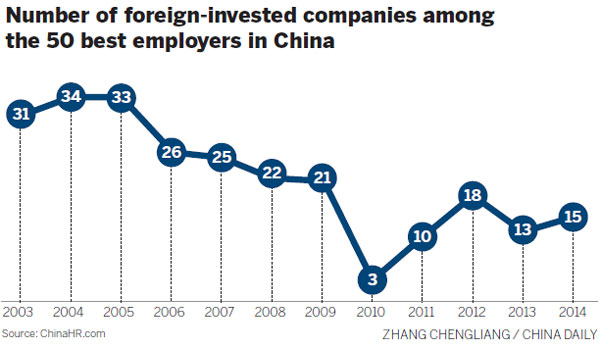Foreign-invested companies losing luster

A 30-year-old junior researcher at Procter & Gamble is unsure whether to stay with the company.
"I get paid well here, but it's hard to see my future in a creative way," says the researcher, who did not want his name used.
He earned his doctoral degree in the United States in 2012 and joined P&G immediately. But he doesn't enjoy the work.
"I am looking for more challenging and creative work," he says. He is applying for jobs with private companies and is looking for more freedom rather than "unlimited regulations and rules to follow".
In recent years, foreign-invested companies have encountered difficulties attracting Chinese job seekers like this one.
According to employment reports released in late July and August by human resource companies ChinaHR.com and Horizon Research Consultancy Group, state-owned enterprises are now the most attractive employers for Chinese university graduates.
ChinaHR.com has conducted "best employer" surveys in China for more than 10 years. Its reports show foreign-invested companies were initially highly regarded, accounting for nearly 70 percent of the top 50 best employers in 2004. However, that perception declined and reached its lowest point in 2010, when fewer than 10 percent of respondents selected foreign-invested companies in the top 50.
This year, about 30 percent of the top 50 best employers are foreign-invested companies, ChinaHR.com reported.
The report from Horizon showed that foreign-invested companies accounted for 24 percent of the top 50 best employers in 2014, down from 38 percent last year.
Ma Ying, head of talent acquisition for the Human Resources Department of Siemens China, says the scarcity of talent is a general difficulty in China, and not only in foreign-invested companies.
"All types of companies, including SOEs and private businesses, have begun to notice a shortage in the market," Ma says.
Chinese job seekers now have more options, she says.
Ma says Siemens is aware that foreign-invested companies are less attractive for jobseekers than they were 10 years ago.
However, she believes each type of enterprise has its own solutions.
"For instance, if an employee is used to the atmosphere in foreign-invested companies, he or she might think twice about entering a private or state-owned company," Ma says.
Siemens is attempting to attract candidates by introducing the company and its work. The company hosts many programs for students, including a summer camp for interns, to help them better prepare for their careers.
Workers may be exposed to more challenging work in multinational companies, she says, but they also may have more opportunities to learn advanced management methods and develop their capabilities.
"There are always more solutions than challenges," Ma says.
Lin Peng, HR director of Dentsply, a leading dental products company based in the United States, also says foreign-invested companies are less popular in China than a decade ago.
"In campus recruitment, especially in big cities, fresh graduates value hukou (China's household registration) more than before, which SOEs have the advantage of being able to offer," Lin says.
Lin also says talented professionals who leave foreign-invested companies sometimes return.
Sun Huijuan, principal consultant at RMG Selection, a human resources and recruitment consultancy, sees a similar trend in recent years.
"The longer one stays in a foreign-invested company, the more difficult it is to adapt to other environments," Sun says.
"Foreign-invested companies used to pay considerable salaries and offer full welfare packages to attract talent. However, when private companies started to increase wages, the salary advantage for foreign-invested companies diminished," Sun says.
The country stopped providing preferential tax policies for foreign firms on Dec 1, 2010.
"Due to the global financial crisis, many foreign-invested companies from Europe and the United States have become more stringent on human costs," Sun adds.
Meng Guang, a senior officer in charge of campus recruitment at zhaopin.com, a popular job website, says foreign-invested companies reduced their scale of hiring in 2008 but increased hiring again three years ago.
"The number of new hires has remained almost the same in foreign-invested companies each year since then," he says.
Contact the writers throughluowangshu@chinadaily.com.cn

(China Daily Africa Weekly 08/29/2014 page23)
Today's Top News
- China reports 5% GDP growth in 2025
- Return capsule of Shenzhou XX safely returns to Earth
- Sanya rises as magnet for Russian tourists
- China's steady opening-up for Asia-Pacific economic growth
- Blueprint seen as a boon for entire world
- 'Kill line' an inevitable outcome of US system





























